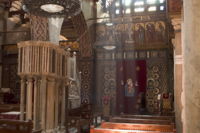Difference between revisions of "Coptic Cairo"
m |
m (links) |
||
| Line 1: | Line 1: | ||
{{Oriental}} | {{Oriental}} | ||
| − | '''Coptic Cairo''' is a part of Old Cairo which encompasses the Babylon Fortress, the Coptic Museum, the Hanging Church, the Greek Church of St. George and many other Coptic churches and historical sites. It is believed that the [[The Holy Family in Egypt|Holy Family]] visited this area and stayed at the site of | + | '''Coptic Cairo''' is a part of Old Cairo which encompasses the Babylon Fortress, the [[Coptic]] Museum, the Hanging [[Church]], the Greek Church of St. George and many other Coptic churches and historical sites. It is believed that the [[The Holy Family in Egypt|Holy Family]] visited this area and stayed at the site of [[Saint]]s Sergius and Bacchus Church (Abu Serga).<ref name=Egyptology>http://www.egyptologyonline.com/coptic_cairo.htm</ref> |
The area was a stronghold for Christianity in Egypt until the Islamic era, though most of the current buildings of the churches in Coptic Cairo were built after the Muslim conquest. of Egypt.<ref>[http://touregypt.net/featurestories/babylon.htm Tour Egypt: Babylon]</ref> The Ben Ezra Synagogue is also located here.<ref>http://www.egyptologyonline.com/coptic_cairo.htm</ref> | The area was a stronghold for Christianity in Egypt until the Islamic era, though most of the current buildings of the churches in Coptic Cairo were built after the Muslim conquest. of Egypt.<ref>[http://touregypt.net/featurestories/babylon.htm Tour Egypt: Babylon]</ref> The Ben Ezra Synagogue is also located here.<ref>http://www.egyptologyonline.com/coptic_cairo.htm</ref> | ||
| Line 10: | Line 10: | ||
The Holy Family visited the area during the Flight into Egypt.<ref>[http://ancientcivilization-geology.blogspot.com/2007/01/metro-and-coptic-cairo.html ancient civilization]</ref> | The Holy Family visited the area during the Flight into Egypt.<ref>[http://ancientcivilization-geology.blogspot.com/2007/01/metro-and-coptic-cairo.html ancient civilization]</ref> | ||
| − | In the 11th Century AD, Coptic Cairo hosted the [[ | + | In the 11th Century AD, Coptic Cairo hosted the residence of the Coptic Orthodox [[Pope]] of Alexandria, which is historically based in Alexandria, Egypt. As the ruling powers moved from Alexandria to Cairo after the Arab invasion of Egypt during Pope Christodolos's tenure, Cairo became the fixed and official residence of the Coptic Pope at the Hanging Church in Coptic Cairo in 1047. |
| − | The Coptic Museum was built in the area in 1910<ref>[http://www.copticmuseum.gov.eg/english/internal/brief_history.asp Coptic museum]</ref> and it | + | The Coptic Museum was built in the area in 1910<ref>[http://www.copticmuseum.gov.eg/english/internal/brief_history.asp Coptic museum]</ref> and it houses the world's most important examples of Coptic art.<ref>[http://www.lastminute.com/site/find/World/Middle-East/Egypt/Cairo/WOW-Attraction-106088.html Lastminute]</ref> |
==Churches of Coptic Cairo== | ==Churches of Coptic Cairo== | ||
| Line 24: | Line 24: | ||
*Saint Barbara Church | *Saint Barbara Church | ||
*The Church of Saint Menas<ref name=Egyptology>http://www.egyptologyonline.com/coptic_cairo.htm</ref> | *The Church of Saint Menas<ref name=Egyptology>http://www.egyptologyonline.com/coptic_cairo.htm</ref> | ||
| − | *Monastery and Church of St. George | + | *[[Monastery]] and Church of St. George |
==See also== | ==See also== | ||
| Line 31: | Line 31: | ||
* [http://en.wikipedia.org/wiki/Coptic_Museum The Coptic Museum] | * [http://en.wikipedia.org/wiki/Coptic_Museum The Coptic Museum] | ||
* [[Coptic|The Coptic Orthodox Church of Alexandria]] | * [[Coptic|The Coptic Orthodox Church of Alexandria]] | ||
| + | * [[The Holy Family in Egypt]] | ||
==External links== | ==External links== | ||
Revision as of 21:15, January 8, 2008
| Note: This article or section represents an Oriental Orthodox (Non-Chalcedonian) perspective, which may differ from an Eastern Orthodox (Chalcedonian) understanding. |
Coptic Cairo is a part of Old Cairo which encompasses the Babylon Fortress, the Coptic Museum, the Hanging Church, the Greek Church of St. George and many other Coptic churches and historical sites. It is believed that the Holy Family visited this area and stayed at the site of Saints Sergius and Bacchus Church (Abu Serga).[1]
The area was a stronghold for Christianity in Egypt until the Islamic era, though most of the current buildings of the churches in Coptic Cairo were built after the Muslim conquest. of Egypt.[2] The Ben Ezra Synagogue is also located here.[3]
History
There is evidence of settlement in the area as early as the 6th century BC. Later the Romans, recognising the strategic importance of the area, built the Babylon Fortress in the area.[4] The area was at the time at the mouth of an ancient canal that once connected the Nile to the Red Sea.[5]
The Holy Family visited the area during the Flight into Egypt.[6]
In the 11th Century AD, Coptic Cairo hosted the residence of the Coptic Orthodox Pope of Alexandria, which is historically based in Alexandria, Egypt. As the ruling powers moved from Alexandria to Cairo after the Arab invasion of Egypt during Pope Christodolos's tenure, Cairo became the fixed and official residence of the Coptic Pope at the Hanging Church in Coptic Cairo in 1047.
The Coptic Museum was built in the area in 1910[7] and it houses the world's most important examples of Coptic art.[8]
Churches of Coptic Cairo
- Saint Mary Church (Haret Elroum)
- Saint Mercurius Church in Coptic Cairo|Saint Mercurius Church
- Saints Sergius and Bacchus Church (Abu Serga)
- The Hanging Church
- Church of the Holy Virgin (Babylon El-Darag)
- Church of the Virigin Mary (Haret Zuweila)
- Saint Barbara Church
- The Church of Saint Menas[1]
- Monastery and Church of St. George
See also
- Coptic art
- Coptic architecture
- The Coptic Museum
- The Coptic Orthodox Church of Alexandria
- The Holy Family in Egypt
External links
References
Source: http://en.wikipedia.org/wiki/Coptic_Cairo#_note-Egyptology
